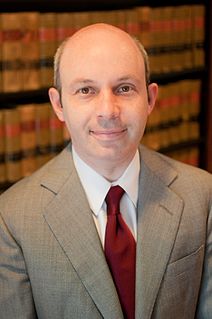Related Research Articles

The Delaware General Corporation Law is the statute of the Delaware Code that governs corporate law in the U.S. state of Delaware. Adopted in 1899, the statute has since seen Delaware become the most important jurisdiction in United States corporate law. Delaware is considered a corporate haven because of its business-friendly corporate laws compared to most other U.S. states. Over half of publicly traded corporations listed in the New York Stock Exchange and 66% of the Fortune 500, including Walmart, the world's largest company by revenue, are incorporated in the state.

Stanford Law School is the law school of Stanford University, a private research university near Palo Alto, California. Established in 1893, it is consistently regarded as one of the most prestigious law schools in the world. Stanford Law has been ranked among the top three law schools in the United States every year since 1992.
A choice of law clause or proper law clause is a term of a contract in which the parties specify that any dispute arising under the contract shall be determined in accordance with the law of a particular jurisdiction. An example is "This Agreement shall be governed by, and construed in accordance with, the law of the State of New York."

Wachtell, Lipton, Rosen & Katz is a law firm that operates out of a single office in New York City. The firm is known for corporate law, regularly handling large and complex transactions. On both a profit per lawyer, and profit per equity partner basis, it is the most profitable law firm in the world.

Martin Lipton is an American lawyer, a founding partner of the law firm of Wachtell, Lipton, Rosen & Katz specializing in advising on mergers and acquisitions and matters affecting corporate policy and strategy. From 1958–1978 he taught courses on Federal Regulation of Securities and Corporation Law as a Lecturer and Adjunct Professor of Law at New York University School of Law.

Thomas Che Goldstein is an American lawyer known for his advocacy before and blogging about the Supreme Court of the United States. He was a founding partner of Goldstein and Howe, a Washington, D.C., firm specializing in Supreme Court litigation, and was, until the end of 2010, a partner at Akin Gump, where he was co-head of the litigation and Supreme Court practices. In 2003, he co-founded SCOTUSblog, the most widely read blog covering the Supreme Court, and remains the publisher and occasional contributor, providing analyses and summaries of Supreme Court decisions and cert petitions. He has taught Supreme Court Litigation at Harvard Law School since 2004, and at Stanford Law School from 2004-2012.

The Supreme Court of Delaware is the sole appellate court in the United States state of Delaware. Because Delaware is a popular haven for corporations, the Court has developed a worldwide reputation as a respected source of corporate law decisions, particularly in the area of mergers and acquisitions.

The Delaware Court of Chancery is a court of equity in the American state of Delaware. It is one of Delaware's three constitutional courts, along with the Supreme Court and Superior Court. Since 2018, the court consists of seven judges. The chief judge is called the Chancellor, and the remaining judges are called Vice Chancellors. The chancellor and vice chancellors are nominated by the governor and confirmed by the state senate for 12-year terms.

Joseph Grundfest is an American academic. He is the William A. Franke Professor of Law and Business at Stanford Law School and co-director of the Rock Center on Corporate Governance at Stanford University. He joined Stanford's faculty in 1990 after having served for more than four years as a Commissioner of the United States Securities and Exchange Commission, a position to which he was appointed by President Ronald Reagan.

Unitrin, Inc. v. American General Corp., 651 A.2d 1361 is the leading case on a board of directors' ability to use defensive measures, such as poison pills or buybacks, to prevent a hostile takeover. The case demonstrates an approach to corporate governance that favors the primacy of the board of directors over the will of the shareholders.

The University of Pennsylvania Journal of Business Law is a scholarly journal focusing on issues of business law, corporate governance, securities regulation, capital markets regulation, the law of mergers and acquisitions, and employment law. The Journal is published four times annually by an organization of second and third year law students at the University of Pennsylvania Law School. The journal is one of six major scholarly journals at the University of Pennsylvania Law School and one of the top five most cited business law journals in the United States.
Leo E. Strine, Jr. is an American attorney and retired judge for the state of Delaware. He served on the Delaware Court of Chancery as vice chancellor from 1998 to 2011 and chancellor from 2011 to 2014, and as the chief justice of the Delaware Supreme Court from 2014 to 2019. Strine has worked in private practice since 2020.

United States corporate law regulates the governance, finance and power of corporations in US law. Every state and territory has its own basic corporate code, while federal law creates minimum standards for trade in company shares and governance rights, found mostly in the Securities Act of 1933 and the Securities and Exchange Act of 1934, as amended by laws like the Sarbanes–Oxley Act of 2002 and the Dodd–Frank Wall Street Reform and Consumer Protection Act. The US Constitution was interpreted by the US Supreme Court to allow corporations to incorporate in the state of their choice, regardless of where their headquarters are. Over the 20th century, most major corporations incorporated under the Delaware General Corporation Law, which offered lower corporate taxes, fewer shareholder rights against directors, and developed a specialized court and legal profession. Nevada has done the same. Twenty-four states follow the Model Business Corporation Act, while New York and California are important due to their size.

Kent Greenfield is an American lawyer, Professor of Law and Law Fund Research Scholar at Boston College, and frequent commentator to The Huffington Post. He is the author of The Myth of Choice: Personal Responsibility in a World of Limits and The Failure of Corporate Law: Fundamental Flaws and Progressive Possibilities, published by University of Chicago Press in 2006, and scholarly articles. He is best known for his "stakeholder" critique of the conventional legal doctrine and theory of corporate law, and for his leadership in a legal battle between law schools and the Pentagon over free speech and gay rights.
Business Courts, sometimes referred to as Commercial Courts, are trial courts that hear business disputes primarily or exclusively. The modern creation of specialized Business Courts in the United States began in the early 1990s, and has expanded greatly in the last twenty-five years. Business courts are operating in New York City and 10 other jurisdictions throughout New York State as the New York Supreme Court Commercial Division, most recently adding the Bronx Commercial Division, Chicago, North Carolina, New Jersey, Philadelphia and Pittsburgh, Pennsylvania, Reno and Las Vegas, Nevada, Massachusetts, Rhode Island, Maryland, Orlando, Miami, Ft. Lauderdale, and Tampa, Florida, Michigan, Cleveland and Toledo, Ohio, Iowa, Maine, New Hampshire, Atlanta and Gwinnett County, Georgia, Delaware's Superior Court and Court of Chancery, Nashville, Tennessee, Wisconsin, Indiana, Arizona, Kentucky and South Carolina. This map shows states having business courts either statewide, in multiple counties or cities, or within a single major city or county, which is accurate through May 2019. In February 2019, through legislation, Wyoming created the Court of Chancery of the State of Wyoming. In May 2019, Georgia's Governor signed a statute into law creating a new statewide business court in Georgia,. that became operational in 2021. In New York, Chicago, Philadelphia, Massachusetts, North Carolina, South Carolina and New Jersey, among other states with business courts, the original programs have expanded by adding judges and/or by expanding into additional cities and counties.
A securities class action(SCA), or securities fraud class action, is a lawsuit filed by investors who bought or sold a company’s publicly traded securities within a specific period of time and suffered economic injury as a result of violations of the securities laws.

Martin P. Russo is an American trial lawyer of Sicilian and Cuban heritage from New York. He handles complex business litigation in state and federal courts throughout the United States, and other matters pending in administrative and alternative dispute resolution forums. He has handled bet-the-company litigations, complicated commercial disputes, financial services litigation, regulatory defense, white collar defense, corporate compliance and internal investigations for publicly held and private companies in the United States and abroad.
The Harvard Business Law Review (HBLR) is a bi-annual legal journal published at Harvard Law School. It is one of the nation's premier sources for legal thought and analysis on subjects including: corporate governance, securities law, capital markets, financial regulation and institutions, financial distress and bankruptcy, and related subjects. Authors published in the journal include leading scholars, practitioners, and policymakers in their respective fields.
Tamika Renee Montgomery-Reeves is an American lawyer who serves as a justice of the Delaware Supreme Court and is a nominee to serve as a United States circuit judge of the United States Court of Appeals for the Third Circuit.
James Travis Laster is an American corporate lawyer and judge who is a vice chancellor of the Delaware Court of Chancery since 2009.
References
- ↑ "About Francis : Delaware Corporate and Commercial Litigation Blog". Archived from the original on 2009-04-24. Retrieved 2009-04-21.
- ↑ "The Harvard Law School Forum on Corporate Governance and Financial Regulation - The leading online blog in the fields of corporate governance and financial regulation". blogs.law.harvard.edu.
- ↑ http://onespot.wsj.com/law/2009/01/11/264324876-chancery-retains-jurisdiction-over-claims%5B%5D
- ↑ "Community".